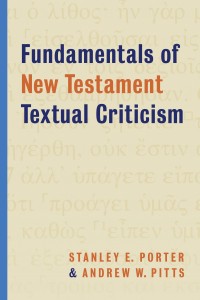 Why should I take this course?
Why should I take this course?
One of the most commonly asked questions in the church today is, “How did we get our Bible?” A related question is, “Is the Bible reliable or has it been corrupted?”
These are not mere academic questions. They affect the very core of the Christian faith. In the past several decades the Bible has been especially attacked on this front. For example, the #1 objection from Muslims to the Christian faith is:
Your Bible is corrupt because it is based on thousands of manuscripts that contradict each other.
Atheists and many other religious groups make the same objections.
Do you know how to answer them?
Many of these objections can be easily answered. You do not have to be a Bible scholar to be able to answer these common objections. But you do need a basic understanding of the history of the making of the Bible; that is, the history of the transmission of the text of Scripture.
Learn to defend the Bible as a trusted, reliable textual source for our knowledge of God and his message for us.
This sixteen week course will equip you to competently understand these issues. It is focused on the New Testament text; although, many of the principles can be applied to the Old Testament. The apologetic value is not the only benefit to the course. More importantly, you will come to appreciate God’s providence in the preservation of his Word, coming away having more confidence in the reliability of the text of Scripture than you had before.
What topics are included in the 16 week course?
- Goals, Definitions, and the Domain of Analysis
- Materials and Methods of Classification
- Greek Manuscripts and Early Versions
- Text-Types and Defining a Textual Variant
- Methodologies and External Evidence
- Internal Evidence: Transcriptional and Intrinsic
- History of Greek Editions and Learning to Use an Apparatus
- Exercise: Decoding Selected Variants
- Exercise: Manuscript Collation
- Text and Translation
- Answering King James Onlyism (Part 1)
- Answering King James Onlyism (Part 2)
- Answering King James Onlyism (Part 3)
- Answering Bart D. Ehrman’s Skepticism
- Answering Muslim Objections
What day and time are the sessions?
The sessions in this course are live, via Skype, personal, one-on-one teaching. We meet typically Tuesdays, but exceptions for other days of the week can be made. Sessions are fifty minutes in length. We will try to find a time slot that will work with your schedule.
Are there quizzes and homework?
Yes. The homework is the weekly reading assignments and on occasion several other types of assignments. I will quiz you orally at the beginning of each session on your readings from the week. These will not be for a grade, but they will show me if you are understanding the material. Expect an average of four hours spent each week on the course.
What does a typical session look like?
It begins punctually, so please log on to Skype a couple of minutes early and I will call you on time. First will be a short quiz. Then we will work through the topics covered in the reading assignments, so be sure to have them read and prepared to discuss the assigned topics. And be sure to make notes on your readings and write down any questions that you may have. At the end of the session I will highlight what you need to focus on in the next reading assignments.
What are the required textbooks for the course?
- Fundamentals of New Testament Textual Criticism by Stanley E. Porter & Andrew W. Pitts
- Novum Testamentum Graece: Nestle-Aland – Greek Edition 28th Revised ed. (There are other versions of the 28th edition of the Novum Testamentum Graece: Nestle-Aland such as this ESV Greek-English New Testament: Nestle-Aland 28th Edition and English Standard Version)
- The King James Only Controversy: Can You Trust Modern Translations? 2nd edition by James R. White
How much does it cost and how do I pay?
A fifty minute, weekly Skype session is $65. You pay weekly, so there is no up-front financial commitment to pay for the entire course. You pay on the day of the session, before or after the session, but make sure to pay that day. Payment is made on the Current Students page.
Contact us for any questions or if you are ready to begin!
*Requisite: You must have at least one year of Greek instruction in order to take this intermediate course. If you would like to take our first year Greek program, please contact us.